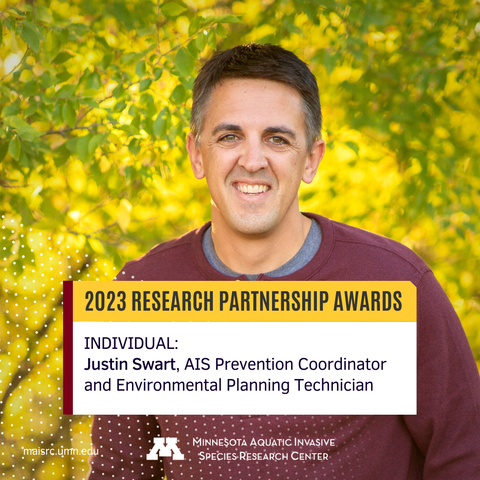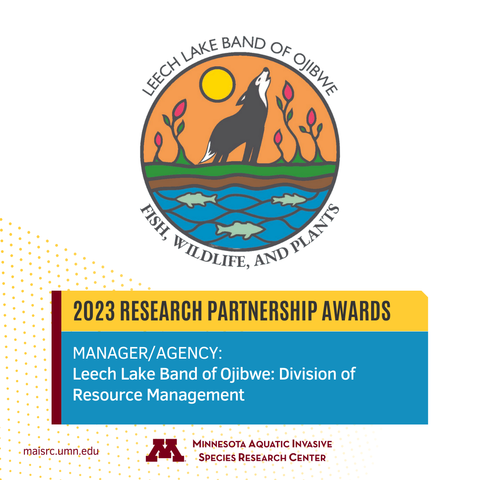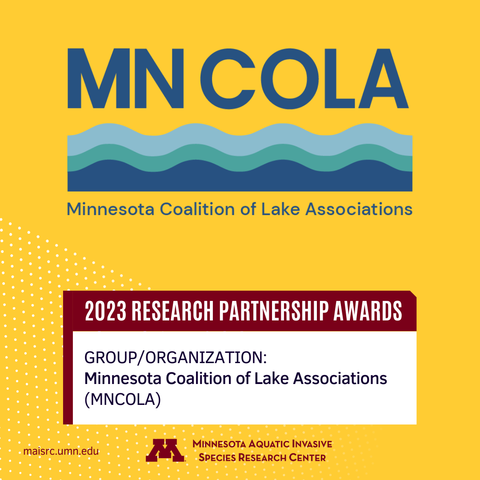The Minnesota Aquatic Invasive Species Research Center (MAISRC) launched the Research Partnership Awards in 2021 to recognize people, groups, and organizations who have gone above and beyond to contribute to MAISRC's mission: advancing aquatic invasive species (AIS) knowledge, and inspiring action to protect and restore Minnesota’s cherished lakes, rivers, and wetlands. Nominations for the award are solicited from MAISRC research teams and partner program staff, with final selections made by MAISRC leadership. The three categories are: GROUP/ORGANIZATION, MANAGER/AGENCY, and INDIVIDUAL. Awards are announced each year in conjunction with the AIS Research and Management Showcase. Read the press release about the awards winners here.
Three individuals/organizations have been announced as the recipients of the 2023 Research Partnership Awards. Recent advances using research to solve real-time threats to Minnesota lakes and rivers would not be possible without these champions:
INDIVIDUAL: Justin Swart
Justin Swart is the AIS Prevention Coordinator and Environmental Planning Technician with Douglas County Land and Resource Management. Justin’s work includes implementing the county watercraft inspection program, directing AIS monitoring projects, administering county AIS control grants, reviewing shoreland alteration projects, and providing information to the public regarding the county shoreland zoning ordinance. Justin is a local coordinating partner with Starry Trek, MAISRC and the University of Minnesota Extension’s annual volunteer search for starry stonewort, and has been since the program’s inception in 2017. He also coordinated recent aquatic plant surveys on 45 different Douglas County lakes which have been included in the PI Charter project. Justin’s partnership is making a difference for our lakes and rivers!
"Local AIS managers are very fortunate to have the Minnesota Aquatic Invasive Species Research Center situated so close to home and conducting local projects. Their research and knowledge provide valuable information that I use in my work and pass along to co-workers, watercraft inspectors, and the public. I am very grateful for the recognition and acknowledge it wouldn’t be possible without the MAISRC projects and partnership opportunities where we can collaborate on AIS research and management. I am glad to assist wherever I can and look forward to continuing our partnership." - Justin Swart
MANAGER/AGENCY: Leech Lake Band of Ojibwe Division of Resource Management
Leech Lake Band of Ojibwe: Division of Resource Management is dedicated to the protection of the water, land, forest, fish, wildlife, plants and other natural and cultural resources present upon the Leech Lake Reservation. Among their many duties, they enforce fish and game laws, regulate logging, wild rice harvesting, and plant resources, and generally protect the Band’s many resources for the use of future generations.
"Kate Hagsten, Raining White, and their colleagues have been outstanding partners in MAISRC research. They have a long record of addressing AIS in waters of the Leech Lake reservation. They are now facing a challenge that they'd hoped wouldn't come: starry stonewort encroaching into an important wild rice bed. They have taken a proactive approach, experimenting with diver-assisted suction harvesting (DASH treatment) to mitigate starry stonewort without harming wild rice. With a commitment to learning while doing, they are increasing the impact of their work by collaborating with MAISRC researchers to better understand starry stonewort's impacts on wild rice and evaluate the effectiveness of DASH management. This will provide important information for other groups working to protect wild rice waters from AIS." - MAISRC Fellow Dan Larkin
GROUP/ORGANIZATION: Minnesota Coalition of Lake Associations (MN COLA)
Created in 1988, the Minnesota Coalition of Lake Associations (MN COLA) traces its origins to 2010 when a need was recognized among individual County COLAs and Lake and River Associations (LARAs) for an organization to network and collaborate, ensuring that their voice in the Minnesota agencies and legislature was unified. MN COLA has been an advocate for research-based solutions to our AIS problems from MAISRC’s beginning. From the end of their docks to the state capital, MN COLA has been disseminating research findings and advocating for research and funding at the legislature - MN COLA is a powerhouse of positive change for our lakes.
"MAISRC is so vitally important for AIS prevention and control in Minnesota and far beyond. Their work is helping us better understand AIS infestations, what we can do now, and what might be possible in the future. While we want solutions to everything now, MAISRC is playing the long-game, and doing the work required to make sure their solutions are right for now AND for the future. Working alongside public partners, our volunteer lake and river associations must do everything we can to stave off more infestations to give MAISRC the time needed so their research can become tools in our toolboxes. We in Minnesota are so fortunate to have the kind of access we have to the researchers and their ideas." - MN COLA Board President, Joe Shneider



